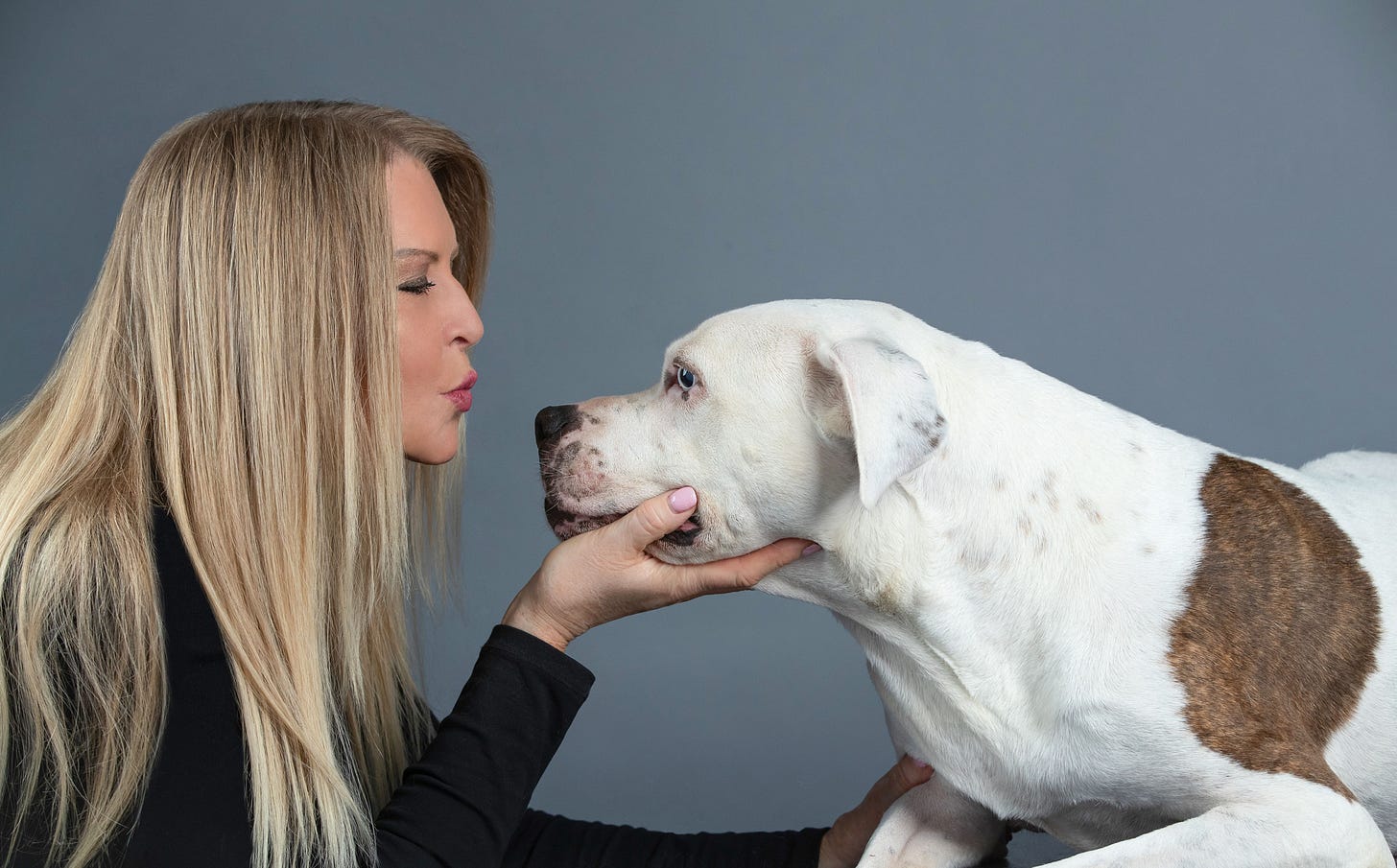The Texas Dog Lawyer
She thought four-legged clients would be less stressful. She was wrong.
“We are looking for the dogs now,” Zandra Anderson frantically emails me. “We have video and receipts that she’s hiding dogs.”
“She” is Elaine Kmiec, a former Houston optometrist who’d been forced to give up over 100 dogs and cats over the years, pets Kmiec housed in deplorable conditions. She’d even spent time in custody for lying to a federal bankruptcy judge about how many animals she possessed.
But right now, Zandra is desperately searching for dogs because I notified her that Kmiec is dead. Could there be animals hidden away without food or water? “This is awful,” she tells me.
What started out as one of my weird business profiles has taken a disturbing turn.
She Does One Thing — Dog Law
Zandra Anderson is The Texas Dog Lawyer. Really. That’s her title. She is one of the few attorneys — maybe the only one — whose entire practice focuses on pets and pet owners. She handles mostly dogs, but she’ll take cat cases if necessary, despite “a mild allergic reaction.”
Being a dog lawyer wasn’t Zandra’s original goal.
“I started out as a trial lawyer with heavy burnout,” she tells me over Zoom from her home office in Houston. In her previous career, she handled serious personal injury cases, including those where people died. “I was just over it,” she says. “I thought about leaving the profession altogether.”
Zandra happened to be a big dog lover, and she was already a passionate advocate for breeds she felt other people misunderstood, like American Staffordshire Terriers, aka pit bulls (she owns a few). Other dog owners sometimes asked her about laws regarding animals. “They wanted to know ownership rights, or they wanted to know what rights the shelter had to kill the dogs.”
In 2005, Zandra decided to hold a dog law seminar at a local bar and charge a small fee to attend. She wrote a manual about Texas pet laws to hand out at the event.
The response was surprisingly strong, with people coming from 65 cities across Texas. “We had to order extra seats,” she tells me with a laugh. She then realized this is what she wanted to do with her life.
So Zandra hung out her “Texas Dog Lawyer” shingle and began taking cases — custody battles between couples breaking up, or animal cruelty cases where she couldn’t find evidence of cruelty. Sometimes she would help rescue operations, sometimes she opposed them.
One of her most memorable cases involved a disabled woman whose cat got a urinary tract infection during COVID. Zandra says the woman’s vet couldn’t see the animal, so she contacted a cat rescue operation for help. But after the rescue group retrieved the cat, Zandra says they refused to give it back, because the woman was disabled. Zandra sued and won, returning the cat to its owner.
Another case made the local news. A cancer patient was tending to her hospitalized husband and came home to find that her pug had escaped. The dog ended up at an animal shelter, and then it was given to a rescue operation that refused to give the dog back. The woman hired Zandra and sued, but by then the rescue group reportedly told them they’d already adopted out the dog. They hadn’t. Once again, Zandra won, and the dog was returned.
Turns out Zandra is something of a pit bull herself.
The Collie Catastrophe
The case involving Elaine Kmiec, mentioned at the beginning of this story, may be the craziest of all.
In 2013, Kara Kaufman was a 20-year-old single mom going to school who had to move back in with her parents. She could no longer care for her three collies, so she put them up for adoption, listing them online. A woman named Sheila Kopman responded.
Kara set up a meeting with the prospective new owner. “She seemed like a nice, normal lady.” She required Sheila to sign a contract saying that if Sheila couldn’t care for the dogs, they’d come back to Kara. “I thought I was doing everything right,” Kara tells me.
She says Sheila paid her around $3,000, but when she came to pick up the dogs, something didn’t feel right. “Her car was a mess,” Kara recalls. “I mean, it was just stuff everywhere… I was a little taken aback.” But she let the dogs go. “I was young, and I don’t think I had the guts to say, ‘Well, hold on a minute.’”
What Kara didn’t know is that Sheila Kopman was actually Elaine Kmiec, a woman with a history of hoarding collies.
After the collies left, Kara couldn’t shake the feeling that something was wrong, so she looked up the address on the contract “Sheila” signed and went to the house with her brother. “The front of the house had all this stuff piled up on the porch and [in front of] the door,” Kara says. She heard dogs barking in the back.
They waited for Sheila/Elaine to come home from work, and when she did, they confronted her. “She kept up her story that she was Sheila Kopman.” She refused to let them on the property or see the dogs. “I basically told her, ‘You don’t give me those dogs back, I’m going to take you to court.’”
And that’s what happened. Kara hired Zandra. “I think I just Googled ‘dog lawyer’ in Houston, and her name popped up.”
What unfolded became a well-publicized case. In court, Kmiec still claimed to be Sheila, until the judge asked to see her ID.
Kmiec then claimed to have power of attorney for Sheila and provided a notarized document that turned out to be forged. “We literally went to the bank and talked to the [notary],” Kara says. The notary told them that was his stamp, but not his signature. “I mean, it was just crazy.”
Kara won back her dogs, but it took time to enforce the judgment, and on the day before she was finally going to get the dogs, Kmiec filed for bankruptcy. (By this time, Kara had run out of money to pay Zandra, but the Texas Dog Lawyer stayed on the case pro bono because she couldn’t let it go.)
If bankruptcy was a ploy, it backfired. The judge ordered Kmiec to return Kara’s collies or go to jail, so she coughed up the dogs. “I took them straight to the vet, and all of them were underweight,” Kara says. “Their coats were terrible.” One collie had an infected gash behind her ear.
When the judge learned of the dogs’ conditions, he ordered the seizure of all animals on Kmiec’s property.
Kmiec claimed she owned a few dozen dogs. There were actually over 100.
Zandra and Kara joined the authorities who went to the property, including the head of the local collie rescue organization. The conditions were horrific, with some pregnant collies living in filth in an unventilated garage “filled full of stuff almost to the roof,” Kara recalls.
But the story doesn’t end there. There would be more seizures, and Kmiec was eventually convicted of making false statements to the bankruptcy court. She spent 10 months in custody, followed by three years of supervised release.
Two months ago, Kmiec sought to end her probation early, but the U.S. Attorney told the court that Kmiec ought to go back to prison for violating several conditions of her release. For example, she had not paid any restitution or gone to any court-ordered therapy. Most alarming, she was accused of owning animals again without getting approval from her probation officer. Prosecutors claimed she was “concealing dogs at a La Quinta Inn & Suites in Tomball, Texas.”
However, by the time prosecutors made that filing, Kmiec was in the hospital with a brain aneurism. As I was trying to reach her to get her side of the story, I learned that she died. (Death certificates are not public records in Texas, so I had to take the word of her lawyer. The judge and U.S. Attorney believe him, so I’ll go with it.) Zandra says three dogs were found living on Kmiec’s properties. So far.
“I, of course, completely regret placing the dogs with her,” Kara says now. “However, had I not ended up going through all of that, all of the dogs would not have ended up getting rescued.”
For Zandra, it was just another day at the office. “I thought animal law was going to be a respite from the real intense personal injury law I was practicing,” she says. “I was wrong.”
What Do Judges Think About Pet Cases?
“For the most part, judges are receptive to whatever case is before them,” Zandra says, though “some judges are kind of annoyed that a dog case is in their court when they have multimillion-dollar cases sitting there.”
Zandra was part of a case that went all the way to the Texas Supreme Court. It involved a German Shepherd that got out and ended up in a shelter. The dog’s owner searched for the dog, but by the time she learned where it was held, the pound had already given the dog to a rescue operation, and the rescue group — once again! — refused to return it, saying the owner lost all rights once the pound had her animal.
Zandra sued. A lower court ruled in her favor, but the rescue organization appealed and won, so Zandra’s side took it all the way to the state’s high court and prevailed. Now it’s state law in Texas that you don’t lose ownership rights just because your pet ends up in a shelter.
Profits Go to the Dogs
The Texas Dog Lawyer makes some money doing this. She charges for an initial consultation, plus standard hourly fees for taking a case to court. She also consults on cases in other states. However, a lot of time she ends up doing some work for free. “It’s not a good way to make money,” she tells me. “Sometimes you just have to do what’s right.”
Of course, Zandra Anderson doesn’t really represent dogs, she represents humans, and sometimes humans get more emotional about their animals than their own children.
“It’s always more about people than it will ever be about dogs.”
🐕🐕🐕🐕🐕
Anyone surprised at how crazy people get about animals? Yeah, me neither. Leave your thoughts in the comments. Meantime, here’s my dog, Princess Leia.
Please share this newsletter and subscribe — how can you say “no” to that face?









Great story! Being a voice for animals doesn’t go unnoticed. Sometimes just have to have a loud voice for things to be noticed.
Zandra Anderson is a person with a big heart. I hope she has a good life ahead of her.